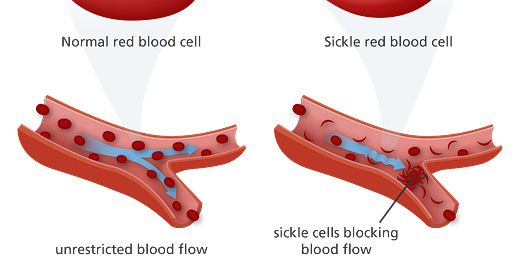Every year, June 19th is a day dedicated to celebrating sickle cell warriors across the globe. However, the entire month of September is devoted to raising awareness about sickle cell disease (SCD).
In case you're unfamiliar with sickle cell disease, SCD is a genetic blood disorder where red blood cells, which are normally round, become crescent-shaped or "sickled." These misshapen cells can block blood flow and reduce oxygen delivery to various parts of the body, causing pain, anemia, and other severe health complications.

Throughout September, from the very first day, numerous events, media posts, and campaigns have been held to create awareness about SCD. According to my own observations, many foundations, even those not exclusively focused on SCD, partnered with SCD-focused foundations to make this year’s awareness campaign a success. It's so good to see so many people and organizations rallying for this cause.
Chances are, you've come across at least one or two posts this month related to sickle cell awareness. If not, this article you’re reading right now serves as one of them. As we wrap up Sickle Cell Awareness Month, I’ll be sharing a few things you can do to ease or improve the life of someone living with sickle cell disease.
A person living with sickle cell isn’t called a “Sickler” rather a “Warrior”
The impact of sickle cell disease varies across carriers; some may barely suffer pain episodes, which are referred to as crises. On the other hand, other carriers experience crises often, which can be mild, severe, almost deadly or somewhere in between. It's important to recognize the special needs of an individual with sickle cell disease (SCD) and offer both practical and emotional support.
Here are some ways you can help:
Educate Yourself About Sickle Cell Disease.
Understanding SCD—its symptoms, triggers, and complications—can help you offer more effective support. Learn about the disease to avoid misconceptions and better empathize with the person’s experience. Know your genotype and your partner’s genotype. Genotype compatibility first before love! Help raise awareness about sickle cell disease within your community by sharing information, participating in awareness campaigns, or even supporting organizations dedicated to SCD research and patient support.
Provide Emotional Support.
People with sickle cell disease experience all-encompassing effects from their condition, including psychological, emotional, financial, educational, career, and relationship problems. Living with a chronic illness can be emotionally draining. Offering a genuine listening ear, showing empathy, and being patient during painful episodes can go a long way. Simply being present when they need to talk or rant can be very comforting.
Avoid Triggers.
There are so many factors that can trigger sickle cell crises, such as extreme temperatures; cold and hot, stress, dehydration, overexertion, e.t.c. You can help by minimizing exposure to these triggers, whether it's avoiding cold environments, rainy weather or ensuring they take breaks when feeling tired. When you are with a SC warrior, take attention of the room's temperature and avoid one that can trigger crisis.
Donate Blood or Advocate for Blood Donations.
A vital component of being a sickle cell warrior is being aware of one's packed cell volume (PCV) — blood percentage. A warrior is more likely to encounter a crisis when their PCV is low. Blood transfusions are a common treatment for people with SCD, especially during crises. You can help by donating blood or encouraging others to do so, as this can be life-saving for sickle cell patients.
Offer Assistance.
You can offer help in several ways like during severe pain episodes or hospital stays, daily tasks like cooking, cleaning, or running errands can become overwhelming. You can offer to help with these tasks when needed, to lighten their load. Hospital visits can be frequent for those living with SCD. You can offer to accompany them to appointments or visit them during hospital stays which can provide much-needed comfort and reduce their stress. Help with meals because healthy living is very important. Hydration is a key aspect of SCD, encourage them to drink plenty of water throughout the day and help them stay hydrated, especially during physical activities or hot weather.
Sickle cell crises can cause severe pain. You can help by providing pain management tools like heating pads, massaging affected areas, or ensuring they have their prescribed medications. Be understanding if they need to rest or adjust plans because of a crisis.
Pray For Them.
Sickle cell disease is extremely unpredictable. Say a prayer for your loved ones who are suffering from sickle cell disease whenever you think of them.
It’s crucial to avoid giving unsolicited advice about their health or making them question their faith in an effort to help. Yes, God heals, but it’s equally important to allow them to take their routine medications without judgment. Respect their health journey and support them without imposing stuff or suggestions that might make them feel pressured or misunderstood.
I hope with these tips, you can make a meaningful difference in the life of someone living with sickle cell disease.
Please share this to help raise awareness. Do something thoughtful for your loved ones living with sickle cell disease before the awareness month comes to an end. Your kindness and support can make a big difference in their journey.
Till next time,
Remember to check your genotype and save the next generation from sickle cell disease!♥




I lost my favourite warrior over a year ago, I saw her go through a lot of pain struggle financially and emotionally too, I was so hurt that she died after all of that. She wanted to travel the world, dance Salsa, get married and do a lot more.
Please do well to know your genotype before you 'fall in love', your love doesn't have to be the cause of a life of pain and struggle for your child. Thank you.
I've gained a deeper understanding of the struggles people with Sickle Cell Disease face."